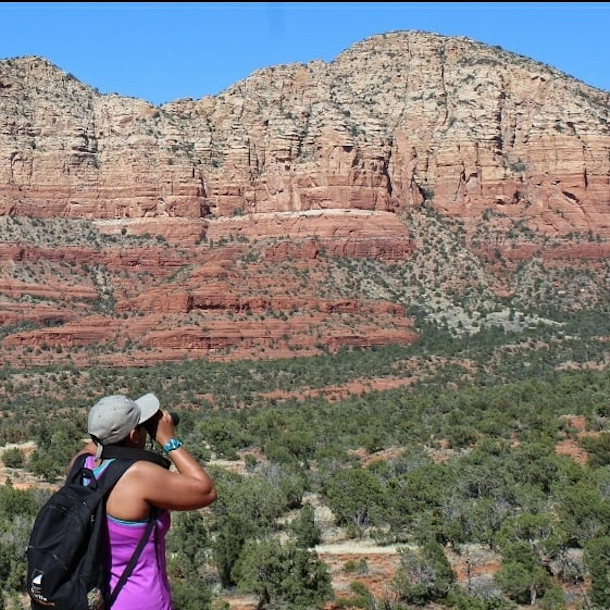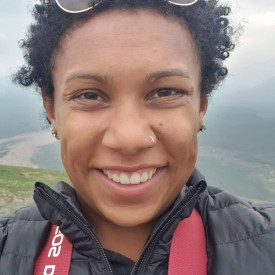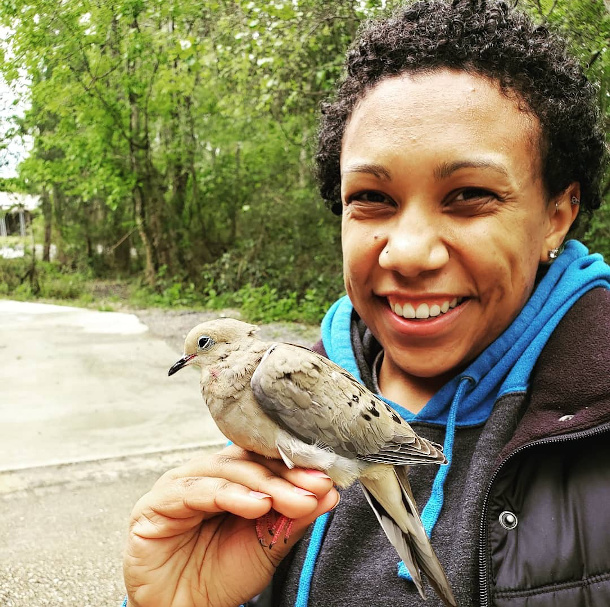#BlackBirdersWeek
Air Date: Week of June 5, 2020

Kassandra Ford birding at Bell Rock near Sedona, Arizona. One #blackbirdersweek event asked Black scientists and nature enthusiasts to submit photos of themselves working and enjoying nature. (Photo: Courtesy of Kassandra Ford)
In the wake of a confrontation and false accusation against Black birder Christian Cooper by a white dog walker in New York City, a group of Black scientists, birders, and nature enthusiasts came together on social media to create the first ever Black Birders Week. Kassandra Ford is one of the event’s co-organizers and a PhD candidate in evolutionary biology at the University of Louisiana at Lafayette, and she spoke with Host Steve Curwood about her own experiences as a Black naturalist and how Black Birders Week is giving a voice to birders of color everywhere.
Transcript
CURWOOD: From PRX and the Jennifer and Ted Stanley Studios at the University of Massachusetts Boston, this is Living on Earth. I’m Steve Curwood.
Back when Black lives first mattered in America, people who look like me were valuable commodities that could be bought and sold, often at high prices and often kept in place with chains. After slavery the chains of violence and discrimination still kept many of us in place, blocking us from certain neighborhoods and shortchanging us in the free labor market. And today, some white people still see Black people as “out of place” in a variety of roles, even being out in nature watching birds. In fact, for years Black birders have been warned to avoid certain times and places for birding, to avoid wearing hoodies and to always carry ID. Just recently Black birder Christian Cooper was birding in New York’s Central Park when a white woman falsely accused him of threatening her life when he complained about her unleashed dog. Now as protests continue nationwide after the horrifying murder of Black and unarmed George Floyd by policemen in Minneapolis, a social media campaign called #BlackBirdersWeek has gone viral. One of the organizers of this event and growing movement is Kassandra Ford, a PhD candidate in Evolutionary biology at the University of Louisiana at Lafayette, and she joins us now. Welcome to Living On Earth!
FORD: Thank you for having me, Steve.
CURWOOD: So how did the movement to start Black Birders Week get started?
FORD: So Jason Ward, who is a pretty prominent Black birder on Twitter, actually created an online group of Black people, who are all in STEM or research fields, to kind of get together and talk on a semi-daily basis. We talk about life. We talk about science, we talk about birds, and even some social issues as well. When the incident happened in Central Park with Christian Cooper, we saw it as an opportunity to spark a movement and a discussion. So by highlighting some positive things that are happening in the birding community, highlighting some amazing Black birders and trying to inspire some new Black birders, we hoped to make something positive out of the situation that arose in a pretty negative light. Our goal is to show the world--pretty much at this point we have a global reach--that Black birders are here, Black people are enjoying nature as much as they possibly can. But there are also some issues with how Black people have to experience the outdoors and issues with making sure that Black people and people of color can remain safe while doing so.
CURWOOD: What's the experience of birding while Black?
FORD: Well, a lot of people have had a lot of different experiences. One of the most prominent experiences that people are probably familiar with is the incident that happened in Central Park with Christian Cooper. Being an African American person and trying to do birding or anything in the natural world can be somewhat dangerous. We can't just experience the outdoors as a white person would. Instead we do sometimes have to take precautions and sometimes we have incidents with the public or with police officers that are not always positive. A lot of people in the group that I am a part of here that's organized and started Black Birders Week, we all have experiences.
CURWOOD: Talk to me about a situation where you felt constrained to be outdoors birding, fishing, whatever, as a person of color.

Kassandra Ford is a PhD student studying the evolution and morphology of electric fish at the University of Louisiana at Lafayette. She also helped co-organize the #BlackBirdersWeek movement. Here she is birding at Denali National Park in Alaska. (Photo: Courtesy of Kassandra Ford)
FORD: As a person of color, I have definitely felt some constraints. There are certain times of day that I will not go outdoors and go on I guess like field expeditions you might call it to go look for animals. I won't go in the middle of the night. Very first thing in the morning is also a time of day that I won't go alone. If I was with a group of people, I might be a little more keen to go, but if it's just me, I stick to middle of the day when I can be easily seen and my intentions understood. A lot of us as Black naturalists also carry equipment prominently showing to kind of show what we're doing and why we're doing it. We might carry our binoculars and cameras and field guides and wear hats that have logos for naturalist organizations showing so that it's pretty clear to bystanders or people around us that we belong there.
CURWOOD: Now, to what extent are Black birders an endangered species?
FORD: I like to think they are a recovering endangered species in the sense that our numbers are growing constantly. I think especially given this movement slash hashtag that's coming out of Twitter. We're seeing thousands of people submitting pictures of them going outdoors, finding birds, having a blast, and you don't have to be a professional to consider yourself a birder. You don't need to own binoculars. You don't need to own a fancy camera. All you need to do is go outside and look up, look into the trees and see if you can find one.
CURWOOD: Hey, Kassandra, what's your favorite bird?
FORD: My favorite bird. I would have to say the Scarlet tanager. It's actually a bird that I saw for the first time this year. We were actually really blessed here to be home for quarantine I guess during spring migration. And our backyard was magically a hub for all of these different migrating birds that I had never been able to see before. And so I saw a scarlet tanager and it was breathtakingly gorgeous. It was unlike anything I'd ever seen before. But it is bright red, but it has dark Black wings. And so it contrasts to its body and male Scarlet tanager is so pretty.
CURWOOD: So by the way, who were your role models in science? I mean, what did you see in the way of representation of Black scientists and ecologists while you were growing up? And what sort of advice do you have for people coming up behind you now?
FORD: Unfortunately, I really didn't have a whole lot of role models that looked like me. Growing up, and even in college, I went to the University of Wisconsin, Madison, and the biology department there is predominantly white, and also predominantly male. And I kind of had to forge my own way, as a Black woman. But I was lucky enough to have some awesome women mentors to kind of show me the way and really inspire me into getting into research. And I was always good at biology, biology was, that was my subject, but it really took going to college and taking some of those higher level classes that really got me thinking about the roots of science and asking questions and trying to figure out how you can answer them. And then once you get those answers, it just leads to more and more questions. And that's probably the thing that I love the most about science is the never ending questions, which some people probably find frustrating, but I fell in love with it. And so advice to kind of that up-and-coming generation, the next people who are going to be our amazing scientists in the future would be: go outside and just start asking questions. You don't have to find out the answers yet. But just starting that process of critical thinking is a really, really important, and I think fun exercise and anyone can do it.

Kassandra Ford holding a Mourning Dove at an Audubon banding station in Bluebonnet Swamp, Baton Rouge, Louisiana. This bird was handled under a banding permit. (Photo Courtesy of Kassandra Ford)
CURWOOD: So the natural world for many people represents a refuge from a lot of the turmoil of our daily realities, whether it's politics or economics or social or traffic, whatever. To what extent do you feel that same refuge when you go out into the natural world?
FORD: I feel it quite a bit. But unfortunately, I am not sure I will ever experience quite as much of a refuge as a person who is not a person of color. So I personally love the outdoors. It's my happy place. It's where I go to have fun and see new things that I've never seen before. But as a Black person, it's also a place where I have to regularly check my surroundings and always kind of have an eye open in the back of your head and make sure that what you're doing is that you're doing something as safely as you possibly can.
CURWOOD: To what extent have members of the outdoor community, the scientific community, been welcoming to you in and in your opinion, what sorts of things could those groups do to make nature a more accessible resource for people of African descent in the United States of America.
FORD: I would say that predominantly societies and the people within them to me have been incredibly welcoming. I have actually had some people that before this, I had just considered Twitter acquaintances, somebody that I might have met for five minutes at a society meeting, or conference, who have really shown up for us. They've been pretty big allies in this conversation and this movement that we're doing in terms of they not only listen and truly care about what people of color and Black people are saying, but they're willing to set aside their own personal voices to amplify our own.
CURWOOD: So what sort of change in the world do you hope this movement can create?
FORD: I hope it creates interest in both Black people and non people of color to go outside and enjoy nature more and appreciate it and work with their local natural organizations and go out and do something that they've never done before, whether it's a local hike at a park, whether it's going to an Audubon event and doing some bird banding and seeing a bird up close that they've never been able to see before. But I really hope that people, regardless of race, take this as an opportunity to really go into nature and appreciate it as much as they can. But at the same time, I also hope that people who are not people of color take this as a positive thing that has come out of a lot of historically negative situations. So whether it was a Central Park incident or any of the incidents that have involved police brutality, we hope that we can spark a conversation to address the problems that are about race in this country and really see if there's a way for us to move forward and make things better and safer for everyone involved, but especially safer for Black people.
CURWOOD: Kassandra Ford is a co-organizer of Black Birders Week and a PhD candidate in evolutionary biology at the University of Louisiana at Lafayette. Kassandra, thanks so much for taking the time with us today.
FORD: Thank you for having me. It was truly fun.
Links
CNN | ‘These Black Nature Lovers Are Busting Stereotypes, One Cool Bird at a Time’
Follow @BlackAFinSTEM on Twitter for more updates and events
Living on Earth wants to hear from you!
Living on Earth
62 Calef Highway, Suite 212
Lee, NH 03861
Telephone: 617-287-4121
E-mail: comments@loe.org
Newsletter [Click here]
Donate to Living on Earth!
Living on Earth is an independent media program and relies entirely on contributions from listeners and institutions supporting public service. Please donate now to preserve an independent environmental voice.
NewsletterLiving on Earth offers a weekly delivery of the show's rundown to your mailbox. Sign up for our newsletter today!
 Sailors For The Sea: Be the change you want to sea.
Sailors For The Sea: Be the change you want to sea.
 The Grantham Foundation for the Protection of the Environment: Committed to protecting and improving the health of the global environment.
The Grantham Foundation for the Protection of the Environment: Committed to protecting and improving the health of the global environment.
 Contribute to Living on Earth and receive, as our gift to you, an archival print of one of Mark Seth Lender's extraordinary wildlife photographs. Follow the link to see Mark's current collection of photographs.
Contribute to Living on Earth and receive, as our gift to you, an archival print of one of Mark Seth Lender's extraordinary wildlife photographs. Follow the link to see Mark's current collection of photographs.
 Buy a signed copy of Mark Seth Lender's book Smeagull the Seagull & support Living on Earth
Buy a signed copy of Mark Seth Lender's book Smeagull the Seagull & support Living on Earth

